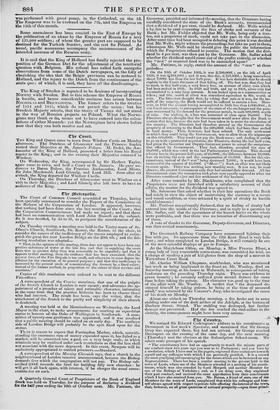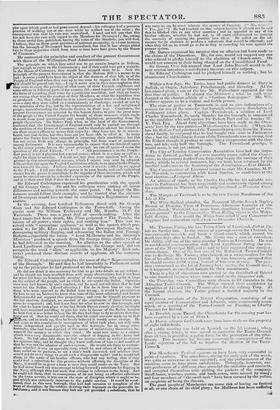ne ernuntrp. We noticed Sir Edward Codrington's address to his
constituents at Devonport in last week's Spectator, and mentioned that Sir George Grey was expected there, but had not arrived. Sir George reached Devonport on the evening of the same day, and the next morning (Thursday) met the electors at the Subscription School-room. We select some passages of his speech.
"The constituency have had an opportunity to watch the minute parts of our conduct since two years ago you sent us to Parliament ; and you have by a resolution, which I have seen in the papers, expressed those sentiments towards myself and my colleague with which I am personally gratified. It is a reward the most gratifying and encouraging for the future which can be bestowed on any Representative. There has been a similar meeting. to the present held in the town of Leeds, where one of the Members attended at a meeting of his consti- tuents, which was also attended by Lord Morpeth and another Member for one of the Ridings of Yorkshire ; and, as I am doing now, they explained their past conduct, and received the same approbation from their constituents which I have also received from you. Mr. Baines, a friend of ours, one of the Members for the town of Leeds, complained that while his colleague and him- self always agreed with respect to private bills affecting the interest of the tom?, that, however, on all great questions of national prosperity—upon those princi- pies upon which good or bad government depend—his colleague bad a perverse practice of walking out of one door while he walked out of the other ; the consequence was that his vote was neutralized. I need not tell you that this has not been the case with regard to the Members for Devoupoit ; for, owing to those useful lists published, having the votes of the Members, you will find, I believe, that on those great questions of national prosperity, in CO one instance has the borough of Devonport been neutralized, but that it has always added two to those majorities which from time to time have been given by the House of Commons."
He contrasted the principles and conduct of the present Government with those of the Wellington-Peel Administration— The principle on which they acted was to go certain lengths in Reform, lust enough to carry on the Government ; and it they could have got a majority an the House of Commons, they would have stopped short he..e. Now the principle of the present Government is, that the Reform Bill is a means to an end: it never could have been the object of the framers of that bill, or of the People of England when they rose up as one man to require th it the Reform Mill should be passed into law,—I say it never was in their contemplation that pi they were to enjoy the privilege of what some of their Cornish neighbours and some others in different parts of the country did—meet together and go through the form of recording their votes for a particular candidate, and then go home, not caring what was the conduct of their Members, or what the legislation was so produced. No, they looked on it as a most important trust confided to them —as a duty they were called on conscientiously to discharge, carried on not by the nominees of the day, but by the representatives of a free and enlightened people, notwithstanding the obstacles thrown in their way. Gentlemen, the present Government ate actuated by this honest desire, to give the great mass of the people of the United Empire the benefit of those measures which ought to result from good government and sound legislation, proceeding from the people themselves. Sir Robert Peel, when at legislation, head of the Government, confessed that the Government of England could only be carried on through the medium of the House of Commons; and he theretore advised his friends to use their utmost efforts to secure that majority : they have not, be it remem- bered, lost that desire, but they have not yet been able to effect it. In many hasthe Tories have been successful in returning their candidates ; but this has not arisen from any change in principle, but from want of unanimity among Reformers. It is very unreasonable to expect that we should all agree in the minor points, but on the great principle we can all agree—I mean the question of Me Irish Church. * * All government is in the l'eople : that power is not a physical but a moral power, which it is a duty as well as a right for them to exercise. I doubt not but that your opinions will be ex- pressed in that constitutional manner, which I rejoice may now be adopted, without that slur upon the English Constitution which, in an appeal to the People, was formerly the case. I believe, however, that it must be settled by an appeal to the People. I tell you that the power is in your hands, and each individual elector has the power to contribute to the support of those measures, which will never be carried except by a decided expression of the opinion of the People, and it is their own fault if they do not do so."
Sir Edward Codrington expressed his gratification with the speech of Sir George Grey. He and his colleague were sinking all minor differences and moving towards the same point. He hoped the Re- formers would follow their example ; and he trusted that the electors of Devonport would lose no time in establishing a Registration Asso- ciation.
In the evening, four hundred Reformers dined with Sir George Grey and Sir Edward Codrington in the Town-hall. Among the guests were Sir William Trelawney and Mr. Rundle, M. P. for Tavistock. There was a good deal of speech-making. After the loyal toasts had been drunk, Mr. Elms proposed " The People, the source of all power; their rights, and nothing less." This was re- ceived with " uproarious applause," as well as the speech which pre- ceded it ; for Mr. Elms spoke home to the Devonport Radicals, by
denouncing military flogging, and advocating the Ballot and Peerage Reform—especially the latter. " Lord Melbourne and his Majesty's Alinisters" produced a speech from Sir George Grey, similar to what be had delivered in the morning. An allusion to the alien speech of Lord Lyndhurst (the present Government, Sir George said, did not recognize the word " alien " as applicable to his Majesty's Irish sub- jects) produced three distinct rounds of applause, all the company rising.
Sir Edward Codrington replied to the toast of the " Representatives of the Borough." He said that he had invariably in Parliament acted up to the principles he had professed on the hustings—
He did not think it was necessary for him to go into details on any subject ; and he should not have troubled them with many observations, had it not been for what fell from an honourable member of the company, who spoke at large on the subject of the people, and in which he advocated the Ballot. Opinions were very well known by one's conduct, and he need not tell them that he had voted for the Ballot. (Loud cheering.) Far be it from him to say, that those who were opposed to the Ballot were wrong : it would be presumption for hint to say so, because he knew that some of the most substantial and honest Reformers did not support this proposition,. and even he himself, previous to the last election, hesitated, on account of the sentiments of those whose opi- nions he respected ; and, had it not been for what he saw in this borough, and
for what he knew took place at the last South Devon county election, he might still have remained unwilling to give his vote in favour of the Ballot, because he held that it was better to bear the ills they had than to fly to others that they knew not of. But he would tell them, that his mind was now made up on that bc"r sessian, and so made up, that he firmly believed it would never change. He had come to this conclusion in consequence of what took place, not only with many independent and upright men in this borough, but in many other boroughs, who had been deprived of the means of maintaining themselves, be-
cause of the manner in which they voted. He must now come to a subject
which was a very disagreeable one—the subject of flogging in the Army and Navy. lie had often told them he had no secrets—that he wished to express
his opinions fully, and he thought they knew sufficient of him to feel confident
that he was not the admirer of such a system. He would ask them to contem- plate whether it was an agreeable duty, which he and others of his profession were called on to perform, to see a man's back lacerated, and whether they
would not do every thing to avoid such a disagreeable sight? and he would tell them, in the name of his brother officers, who had any feeling, that if they could find a substitute for this practice without affecting the discipline of the Navy, it would be as great a boon as ever they could confer on the Navy. But he had never heard any man attempt to bring forward a substitute for flogging in the .Navy, although they had made that attempt in reference to the Army. And he could tell them, that in consequence of its not being an effective substitute in the latter service, it was not in the state of discipline which it ought to be, and which was extremely injurious to the public service. It would be recol- lected, that in this very borough, they had had occasion to complain of the want of discipline, by the soldiers drawing their bayonets on the peaceable in- ,habitaots ; and it was because they had not yet provided a substitute, that he
was sorry to say he must tolerate the system of fogging. (" 1V O, neve r " " Yes, yes !") He had touched on this subject because it should nut be said that he blinked this or any other question ; and he appealed to any of his brother officers, whether he had not, in all cases, endeavoured to prevent the necessity of carrying the practice into effect. Ile called on the ad- vocates for its abolition to produce a substitute that should be effectual; and when they did so, he would go as far as they in recording his vote against the present system.
Mr. Batten expressed his surprise that no allusion had been made to the claims of the Dissenters. He, for one, would riot support any one who refused to pledge himself to the abolition of Church-rates. He would not consent to their being charged on the Consolidated Fund. Sir George G-oy felt assured that Lord John Russell would in the next session introduce n satisfactory measure on this subject. Sir Edward Codrington said he pledged himself to nothing ; but he abominated Church-rates.



























 Previous page
Previous page